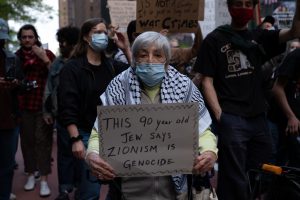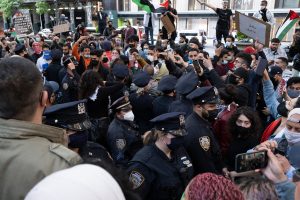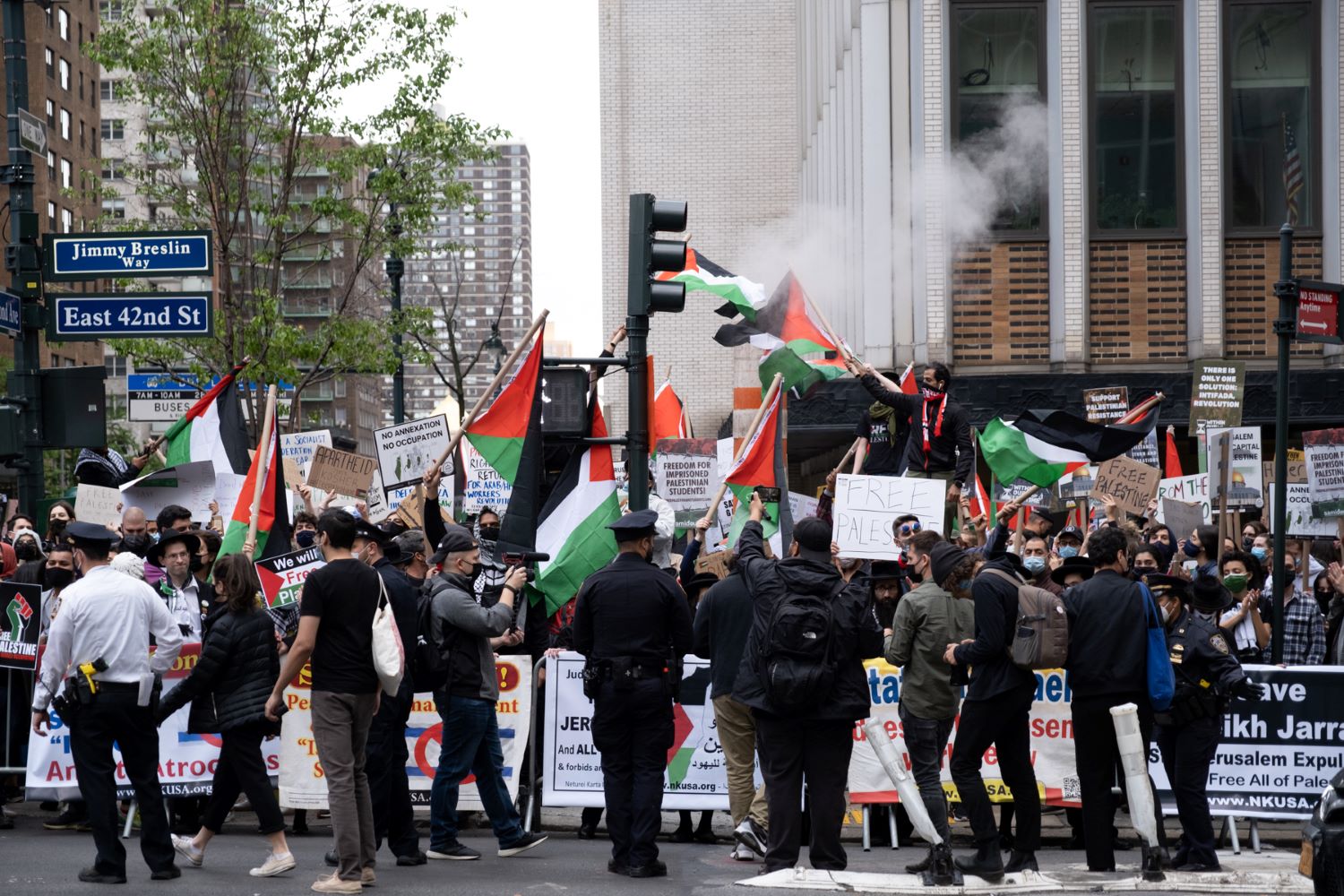Photo by H.A.
Photo caption: On May 11, 2021, thousands of anti-occupation protestors gathered outside the Israeli Consulate General in Manhattan to decry Israel’s bombing of Gaza and ethnic cleansing of Sheikh Jarrah and other Palestinian neighborhoods in East Jersualem.
Seven hours is a long time to be dead. Seven hours is also a very long time in the breaking news cycle, and it’s practically an eternity when the events surrounding a death are live-streamed to social media before they even make their way into the cycle. It’s the kind of time that allows for legacies to be written, then attacked, then muddied.
By the time I woke up in Detroit in time for my 7 a.m. breaking news shift on May 11, Shireen Abu Akleh, who was killed by an Israeli soldier using an American rifle on occupied Palestinian land, had been dead for seven hours.
By the time I woke up in Detroit, Palestinians residing in Palestine and elsewhere in the Arab World, my family and friends among them, had lived with the news of Shireen’s death for hours. They had, for hours, cried, reminisced, seethed.
By the time I checked my phone that morning, compilation videos of the slain journalist’s TV reports had already been created and circulated. They show her standing tall against backdrops of apartheid walls and hospitals, surrounded by Israeli soldiers and Palestinian protestors, signing off into her microphone:
“Shireen Abu Akleh, AlJazeera, Occupied Nablus.”
“Shireen Aby Akleh, AlJazeera, Occupied Jerusalem.”
“Shireen Abu Akleh, AlJazeera, Occupied Palestine.”
By the time I called my best friend, frantic, upon seeing the news, it was early morning for me and mid-afternoon for her. She had already taken the bus to her college classes and had argued with younger students working toward a career in journalism, furious at them for not understanding the crushing weight of the news.
Shireen Abu Akleh, a pillar of Palestinian journalism, a voice amplifying Palestinian resistance to a brutal occupation, had just become its latest casualty.
Israel occupies Palestinian land and imprisons its natives. Israel attempts to obfuscate facts and scapegoat resistance forces when it kills Palestinians in broad daylight, as it did with Shireen, falsely claiming that it could have been Palestinian fire that killed the journalist. Palestinian voices, like the bodies that produce them, can reliably expect vitriol and suppression from the Israeli forces they rage against. All of this is endemic to the occupation, and hardly a point of contention.
However, though oppressed communities tend to make icons of whatever voices can break through oppressive power structures, Palestinians also often find themselves in the all-too-familiar position where they can, also fairly reliably, expect vitriol and suppression from their own side. This happens when deviations from rigid value systems threaten to upset deeply-rooted cultural traditions and beliefs.
By the time I woke up the day of Shireen Abu Akleh’s murder, the tensions surrounding ideas of borders and culture and the questions of who is accepted and who isn’t had already started bubbling to the surface, and the implications on the terms of our liberation were stark.
Resistance movements are never monolithic because the communities they represent are never monolithic. It’s a tale as old as time: people crave kinship and representation, and so they generally want their icons to look like them, act like them and adhere to the same rules they themselves follow.
Describing Shireen Abu Akleh as a pillar and a voice of Palestinian resistance aligns with much of the rhetoric that flooded social media from people in Palestine, in Jordan, across the Arab World and beyond. Many mourned her death, posting to Facebook and Twitter using language that upheld her as a martyr, a righteous victim of the occupation she reported on. But that is not a complete distillation of the reactions to her death.
When someone dies, a trigger response in Arabic is to invoke Allah’s mercy on their soul. Some see it as a sentiment that transcends religion, despite its clearly religious connotation. For many, however, Allah’s mercy must be reserved for those they see as worshippers of the correct one.
Shireen Abu Akleh was a Christian, and if you wade into the comment sections attached to posts about her killing, peppered among prayers for God’s mercy and forgiveness, you invariably find a barrage of comments with an all-too-common castigation, demanding that Muslims not invoke Allah’s mercy on a non-Muslim. Others go further still, proclaiming that as a Christian, Shireen Abu Akleh cannot represent the Palestinian cause which they deem an inherently Muslim one. Christians, too, brandish Christianity and its Palestinian roots as the soul of the cause, the reason to fight to reclaim Palestine from Israel.
Other users push back, saying Shireen and the Palestinian cause should not be viewed through a religious lens, that the Zionist state is indiscriminate and oppresses Palestinians because they are Palestinian, not because they are Muslim or Christian. Still, the dissent, and ensuing infighting, is unrelenting. People who so desperately yearn for representatives and icons within their country’s borders and beyond them start fights online over who is a legitimate representative and, more often, who is not.
While Israeli soldiers descended on Shireen’s funeral, terrorizing pallbearers and nearly causing her body to tumble out of her coffin, extremists who looked like Shireen, whom she defended and who spoke her language, attacked mourners on the internet, telling them God would not have mercy on her soul, that they were not allowed to ask for such grace. These acts, one colonial and the other misguided, taint the spaces we create to honor the memory and service of someone like Shireen Abu Akleh.
It’s not just religion that, for many Palestinians and Arabs who concern themselves with the Palestinian cause, determines who is worthy of divine mercy, and it is not only when someone dies that the policing begins. Moral standards are prescribed across an expansive slate of identifiers that aspiring activists need to represent for their activism to be validated, embraced.
In May 2021, a year to the day before Shireen Abu Akleh was killed in Jenin, I was in New York City covering an action outside the Israeli Consulate General. Thousands of people showed up, protesting on a scale I never would have imagined for a pro-Palestine gathering in the United States, the greatest proponent of Israel’s borders and its so-called right to ‘defend’ them by physically, ideologically, economically, and legally repressing Palestinians.
They showed up in droves that Tuesday to denounce renewed Israeli aggression against Gaza and efforts to cleanse the East Jerusalem neighborhood of Sheikh Jarrah of its Palestinian residents, mirroring and perhaps facilitating a crescendo of similar actions across the United States.
Nestled in that beleaguered neighborhood is the family home belonging to the El-Kurd family, half of which has been occupied by settlers installed there by the state in 2009. Nestled within the family are its twin children, Muna and Mohammed El-Kurd.
In 2011, The Guardian released a short documentary filmed by Muna and Mohammed at age 11. The movie captures quotidien scenes of a family being forced out of its home by settlers.
In the time since its release, the twins have been able to carve for themselves a space in local and Western media that they continue to successfully use as a pulpit for their causes: saving Sheikh Jarrah residents from evictions, sanctifying the Palestinianness of Jerusalem, and, ultimately, bringing about a Palestine that has authority over its own borders, free from the powers that occupy it and the powers that protect them.

In May 2021, the twins catapulted to a renewed and much wider fame, when they began to publicize settler activities — notorious among them was Yaakov Fauci, an anti-vax MAGA New Yorker from Long Island squatting in the Kurd family home — to displace Palestinians in Sheikh Jarrah, via social media livestream and numerous media appearances, including on US outlets. Israel has since detained and subsequently released both of them. Mohammed is now the Palestine correspondent for the news outlet The Nation.
In watching Muna and Mohammed move through space, in Palestine and abroad, and interact with the worlds, physical and digital, around them, one can’t help but admire their fierce demeanor and impassioned rhetoric that seems to beget those who become spokespeople for revolutionary movements. The story doesn’t end there, though.
Initially embraced by Palestinians, Arabs and friendly Westerners alike as well-spoken and young faces of Palestinian resistance, renewed fame has brought with it renewed scrutiny at home of the siblings, particularly Mohammed, while attempts to silence his advocacy abroad continued.
Soon after Shireen was killed, photos surfaced on the internet of Mohammed at LGBT+ events in Palestine and in the United States, where he lives when he isn’t in Jerusalem. In one, he appears to be chanting at a protest while holding a sign that reads “A Queer Bellow for Freedom.”
People circulated them on Facebook and Twitter, tacking on captions that claimed they had always suspected Mohammed was gay, disavowing his activism and his sister’s in the process (at least one user chimed in: “Of course this makes sense, his sister is manlier than he is.”), and going so far as to say that a Palestine who accepts the likes of him is not a Palestine worth fighting for.
At the exact same time that a smear campaign had begun against Mohammed at home, signaling that the the Palestine he fought for may not be safe for him, the German Goethe Institute disinvited him from a panel on far-right movements because, it posted on Twitter, he has made comments about Israel which it “did not find acceptable.”
This kind of rhetoric is the latest in a continued pattern of silencing and penalization of Palestinians and people with pro-Palestine views writ large. In 2021 alone for example, around the same time that Israel bombed the building that housed the Associated Press in Gaza, the outlet fired an American reporter for pro-Palestine posts she made in college, and the German outlet Deutsche Welle fired seven Arab staffers for alleged anti-Semitism, which is a euphemism for pro-Palestinian.
When the Mohammed incident began to unfold, Zionists celebrated the disinvitation, at once using the homophobic campaign as proof that Palestinians are regressive, relishing in Mohammed’s rejection by swaths of his own people, and continuing to hurl abuse at him for his Palestinian activism.
In his book Queer Palestine and the Empire of Critique, Sa’ed Atshan describes this intersection of oppression at which queer Palestinians find themselves as “ethnoheteronormativity.” Different forms of discrimination coalesce: they face homophobia and transphobia in Palestine, where violence against the communities is not unheard of and often sanctioned by the Palestinian Authority, combined with racism and repression in Israel and from its allies. What’s more, Israel pinkwashes its occupation by claiming to be a safe haven for queer people, Palestinians or otherwise, while weaponizing their queerness against them. And the pinkwashing works. Queer people around the world flock to Tel Aviv Pride, raving about how safe and carefree they felt dancing on the streets of this colonized land.

The occupation strips the people that live under it of most control, but power structures still exist within occupied societies, and the people at the top of these hierarchies still wield them against minorities. The occupied can repress, no matter how nominal the repression may seem compared to the occupation.
So what is a non-normative Palestinian to do, in Palestine and abroad, when their identities offend those that hold whatever version of power applies? What, exactly, is a normative Palestinian?
I moved to the United States from Jordan, where I grew up, a few years ago. Even before my relationship to Palestine existed on a seven-hour delay, it often felt conditional, tenuous, as a queer Palestinian living in the diaspora. I’ve long moved on from the days when I internalized the belief that my Palestinianness and my queerness were incompatible, raging against each other inside the borders of my body and trying to take it down in the process.
But the world around me constantly tries to pit them against each other. I often fear becoming too involved in either Palestinian or queer activism, for fear of retribution from either one.
And this is why what happens to the likes of Shireen Abu Akleh and Mohammed El-Kurd, both extraordinary and mundane in the violent landscape of Palestinian revolution against Israeli opression, both extraordinary and mundane in a global atmosphere which fundamentally denies liberation and power to Brown or Black or poor bodies, is so important. Committed to the plight of truth telling in the face of oppressive power, her death serves as a symbol of the campaign to silence those who see humans rather than borders. Her death provokes us to think long and hard about what we are actually fighting for when we fight for freedom. Are we only defending land, or are we defending our collective humanity, our right to live as we wish and as we need to without fear of punishment or exile?
At home, where I am allowed to be unabashedly Palestinian, my queerness is under attack. When I cross the border, go to Europe, come to the United States, I can express my queerness, most of the time, but I risk losing jobs and opportunities and status if I’m too Palestinian in the wrong setting. I have to fight to prove to the state that I am worthy of a visa, a work permit, a right to exist within its borders.
In spite of those contradictions and although I often feel alienated from Palestinian spaces, I have never lost faith in the Palestinian cause, and I hope the people who come up against anger and hatred from the occupier and from their own people never do either. If it is to succeed, Palestine needs every last believer in its liberation. Seven hours may be a long time to be dead, but imagine what we could do in seven hours if we demanded a new accounting for how we spend our time on this earth together. I only pray that one day, we all understand that a Palestine free from Israeli oppression can only come about if it is free of all oppression. It can only be free if everyone in it is free.


